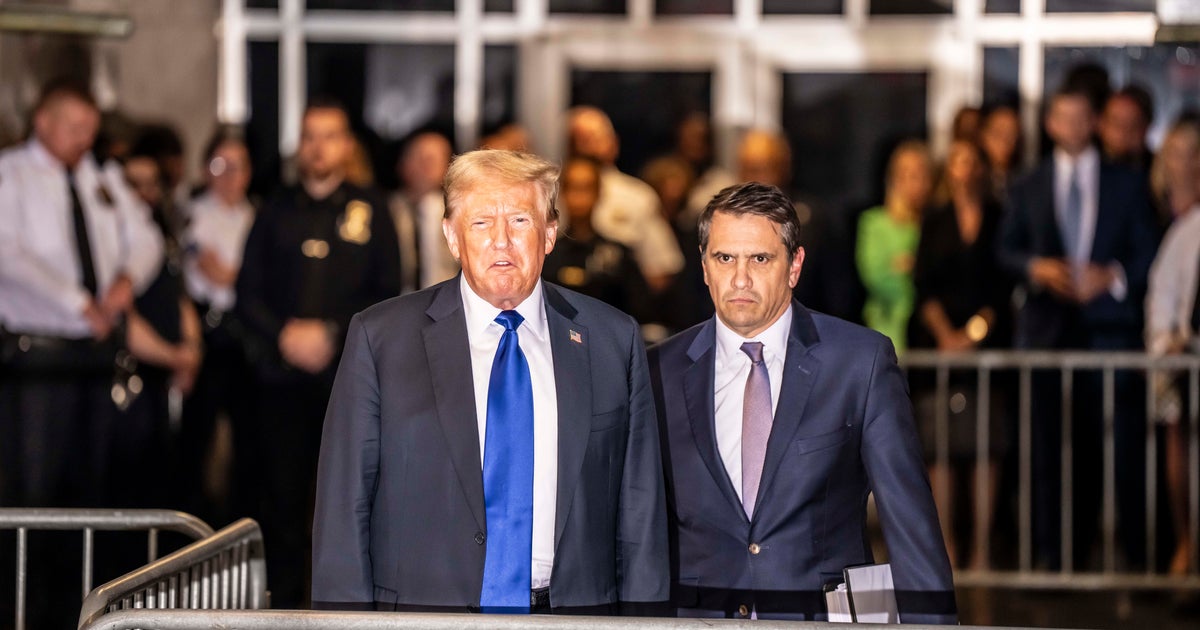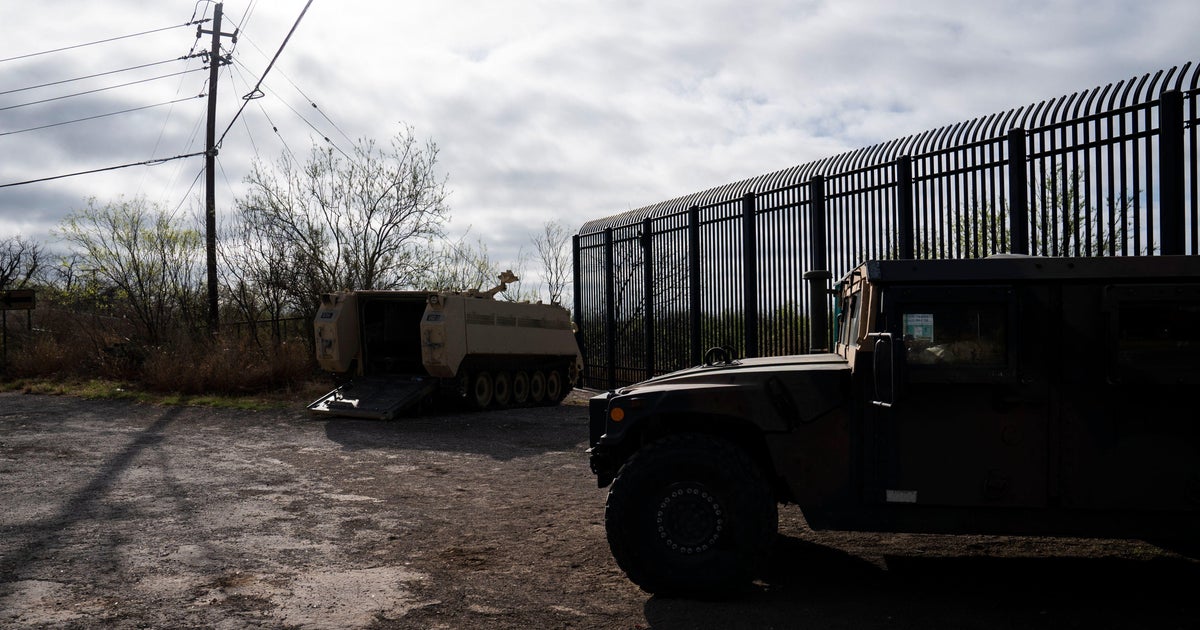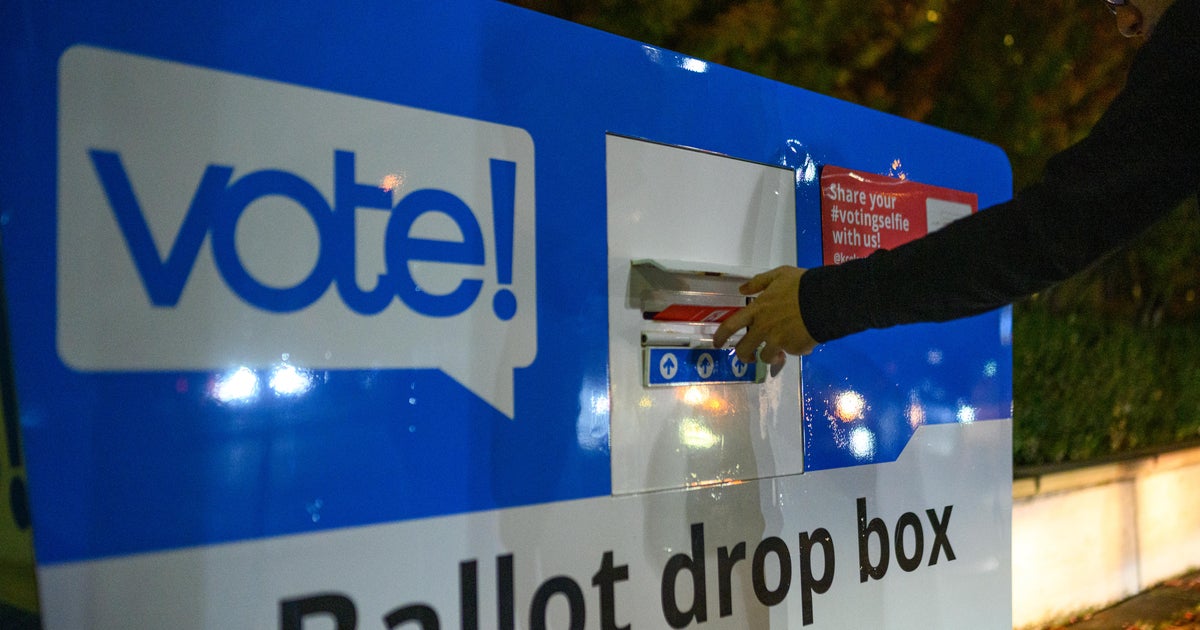How a former CIA officer was caught betraying his country
Kevin Mallory was a down on his luck former clandestine case officer for the CIA when he was approached by a man the Department of Justice believes was a Chinese spy. Officials say Mallory was a prime target for recruitment. He was out of work, three months behind on his mortgage, and thousands of dollars in debt. But as we first reported in December and as the Chinese would discover, Kevin Mallory wasn't exactly James Bond. The Department of Justice agreed to show us how they caught Mr. Mallory and why they believe his recruitment by China is part of a massive clandestine campaign to steal not just national security secrets from the U.S. government, but industrial and technological secrets from American companies.
This is what espionage looks like. The man standing on the right in the yellow shirt is Kevin Mallory, who once held a top-secret security clearance while working for the CIA and the Defense Intelligence Agency. Footage from a surveillance camera at a Virginia FedEx store in April 2017 caught him as he prepared to hand a clerk stacks of classified documents to be scanned onto an SD card, the kind that can be inserted into a mobile phone.
Ryan Gaynor: So this is the rare moment, right, in an investigation, in an espionage case, where we actually have video footage of the individual preparing the classified material for transmission to the foreign intelligence service.
We watched the tape with Ryan Gaynor, the FBI supervisory special agent who investigated Mallory, and Jennifer Gellie, who prosecuted the case against him for the National Security Division of the Department of Justice. They say Kevin Mallory sent national security secrets to a Chinese spy on a covert communication device.
Jennifer Gellie: So here you see him talking with the store clerk about the scanning job. And throughout this video you see little pops of yellow, little yellow pieces of paper that flash by when he's showing the documents. That was important for us because the document that he successfully passed consisted of a typed-up white piece of paper, that was the classified information followed by two yellow sheets of paper with his handwriting on them. And here you can see--
Anderson Cooper: So that's the-- those are the yellow sheets of paper?
Jennifer Gellie: You can see the yellow sheets of paper going through that scanning process.
Prosecutors say some of the information Mallory sent could have revealed the identity of a couple who had secretly spied on China for the U.S.. It was a very personal betrayal. Mallory had supervised the couple years before.
Anderson Cooper: He was betraying people. This is people's lives at stake.
Jennifer Gellie: Correct. These were documents that specifically talked about human beings. Whose lives could be in danger.
Anderson Cooper: If they had traveled to China they could have been arrested.
John Demers: At the time he gave the information to the Chinese intelligence officer, he knew they were planning on traveling to China.
John Demers is the top official in charge of the Department of Justice's National Security Division, which helps guard the U.S. against terrorism, cyberattacks, and espionage. He's responsible for coordinating activities across law enforcement and U.S. intelligence agencies. He says Kevin Mallory's recruitment is just one of many efforts by the Chinese Ministry of State Security, or MSS, to spy on the United States.
Anderson Cooper: What is MSS?
John Demers: So MSS is the principal intelligence agency of the Chinese government. And in rough terms it is like the CIA and the FBI put together.
Their capabilities are world-class. They have cyber capabilities, they have expertise in turning people into cooperators. And they have all of the tools and expertise of a very capable intelligence organization.
John Demers says Kevin Mallory hadn't worked for any U.S. intelligence agency in five years, but he was still of interest to China. He spoke Mandarin, was desperate for money, and had classified information he might be willing to sell.
John Demers: You're looking for people who will be willing to work with you for one reason or another. You start very slowly. you start to see what information they are willing to share with you originally, innocuous information. Then something maybe slightly more sensitive and so forth. And that relationship develops over time. It's a patient process.
Anderson Cooper: It's a grooming of an intelligence asset.
John Demers: It's a grooming and it's a constant testing to see what the person is willing to do.
The Chinese didn't reach out to Kevin Mallory in a dark alley like in a movie, they made contact with him like any job recruiter would, they sent him a message on the career networking site, LinkedIn.
Anderson Cooper: What could the Chinese tell from reading his LinkedIn page?
Ryan Gaynor: When you look at this LinkedIn page, it's very clear immediately that he worked in national security, that he had the type of background that the Chinese intelligence services are most interested in.
Anderson Cooper: He's good at national security, military, international relations, counterterrorism, security clearance, dispute resolution. This is a signpost to "I was a former intelligence official."
Ryan Gaynor: And it led to what you would expect.
Mallory ended up in contact with this man, who called himself Michael Yang, and claimed to be an employee at a Chinese think tank.
Anderson Cooper: So he's a Chinese intelligence officer?
Ryan Gaynor: We believe him to be a Chinese intelligence officer and more importantly, Mr. Mallory when meeting with him believed him to be an intelligence officer.
Over the next several weeks, Michael Yang paid Mallory $25,000 to come to Shanghai twice and Mallory reached out to former colleagues at the CIA asking to be put in touch with people who had current intelligence on China. Prosecutors say his former colleagues grew suspicious and reported him to CIA security, putting him on the radar of law enforcement.
When Mallory returned from his second trip to China, he was stopped by customs at Chicago's O'Hare Airport. He had lied on this form about how much money he was carrying, more than $16,000 in cash, and agents discovered this box with a phone in it. Mallory claimed it was a gift for his wife but it was actually a covert communication device that had been given to him by Chinese Intelligence.
Anderson Cooper: This looks just like a regular phone. What makes it a covert communication device?
Ryan Gaynor: So it's not so much the hardware. The phone itself had a unique piece of software installed on it designed to allow secure communication both in text and also the secure transmission of documents later.
You might think a former CIA officer would be cautious about the texts he sends to a Chinese spy, but Kevin Mallory was remarkably direct, complaining about the money he was paid and the risk he was taking.
"Your object is to gain information," he told Michael Yang, "and my object is to be paid for."
"I will destroy all electronic records after you confirm receipt," Mallory wrote to Yang. "I already destroyed the paper records. I cannot keep these around, too dangerous."
"At this point all the risk is on me."
Jennifer Gellie: So he says, "I'm taking all the risk." But then he goes on a few bubbles later to actually try to transmit additional information to the Chinese.
But technology wasn't Mallory's strong suit. He complained to Michael Yang that the phone wasn't working properly.
"This system sucks. It's too cumbersome," he wrote. "I put all these messages and then and you can't read them because you are not logged in the same time, that's a poor system."
At this point, prosecutors say, Mallory was scared. He'd been stopped at customs and he feared the CIA and FBI were onto him. Prosecutors say he decided to come up with a cover story and reached out to the CIA telling them he thought he was being recruited by Chinese spies. The CIA called him in for an interview.
Mallory in CIA interview clip: My judgement is, and we haven't gone through this conversation, that these guys work for Chinese intelligence… so my sense is that they were looking for government secrets. U.S. government secrets at some level.
In this meeting, Mallory admitted the phone was a covert communication device given to him by the Chinese, but prosecutors say he lied about the classified documents he'd already sent.
Interviewer in CIA interview clip: Did you send them anything on that phone?
Mallory in CIA interview clip: I sent them some tests of some sort, just to see if I could do it right. And I couldn't figure it out. I messed that up.
Ryan Gaynor: He's trying to control the narrative so what you have here likely is an attempt to steer the story, to explain away some of the more alerting pieces while not admitting to the criminal activity of providing the classified information to the foreign intelligence service.
Jennifer Gellie: We now know at this point in time Kevin Mallory has successfully sent the classified table of contents, the classified white paper, and tried to send several other documents unsuccessfully.
"We currently have three pending cases against former intelligence officers and they're alleged to have been spying on behalf of the Chinese."
Mallory offered to bring in the phone to be examined by the CIA, confident that all his messages to Michael Yang had automatically been deleted.
Anderson Cooper: So he believes, everything he's sent has disappeared from the device. So that's why he's willing to bring the device in?
Ryan Gaynor: We have every reason to believe that he believed at the time that those communications would be gone.
Two weeks later, Mallory arrived at a hotel room in Ashburn, Virginia for a second meeting with the CIA. When he got there, the FBI was waiting for him, along with a computer forensic examiner. He agreed to show them how the phone worked.
Ryan Gaynor: When he goes to demonstrate it, up on the screen where he expects to have his whole chat history basically deleted, up on the screen, comes some of the chat history.
The FBI recorded the meeting.
FBI AUDIO CLIP :
Mallory: I'm, I'm surprised it kept this much.
FBI: So, you made a comment that you were surprised that there was this much there.
Mallory: Right, 'cause you-- 'cause this, right-- 'cause, uh, in the past, uh, maybe it was the s-screen size or something 'cause some of it just disappeared.
One of the most incriminating messages that appeared on the phone was Mallory planning another trip to China. "I can also come in the middle of June," he wrote. "I can bring the remainder of the documents I have at that time."
Ryan Gaynor: From the FBI perspective, this is a pivotal moment in the investigation.
Four weeks later, the FBI arrested Kevin Mallory and searched his home. Hidden in the back of this closet in a junk drawer, agents discovered an SD card wrapped in tinfoil, on which he had placed eight secret and top-secret documents, the same ones he scanned at that FedEx store in April.
Ryan Gaynor: It is our belief that it was his intention to take this SD card to China to provide to them.
Anderson Cooper: Does the Mallory case fit a pattern that you're seeing coming from Chinese intelligence?
John Demers: Yes. We currently have three pending cases against former intelligence officers and they're alleged to have been spying on behalf of the Chinese.
Anderson Cooper: It's hard to overstate how unusual it is to have three cases like this ongoing.
John Demers: It's not unusual. Its unprecedented.
Bill Evanina: To me it's disappointing and its really hurtful, I think, to everyone to know that we still have people who are willing to betray the U.S. for a few dollars.
Bill Evanina is director of the National Counterintelligence and Security Center, a division of the Office of the Director of National Intelligence. He serves as the U.S. government's top counterintelligence official.
Anderson Cooper: When it comes to espionage against the United States, does China pose the greatest threat or Russia?
Bill Evanina: When it comes to espionage, China poses the greatest threat. And it's not even close compared to Russia or Iran or any other country. And if you include economic espionage, industrial espionage, it's not even in the same ballgame.
Anderson Cooper: When most people think of espionage, they think of somebody in a trench coat trying to steal a state secret. What's happening now with China, it's not just about state secrets, it's about technological secrets that's the prize that China wants.
Bill Evanina: That's correct. It's trade secrets, proprietary data, intelligence, emerging technology, nanotechnology, hybrid, anything that they can see that is the future. Supercomputing, encryption, those are the issues that they look at. And they have a prioritized schedule that they look at and they send people forward to go collect that data.
John Demers, of the Justice Department's National Security Division, says since 2011, more than 90 percent of the economic espionage cases they have charged have involved China, which has stolen secrets about everything from genetically modified rice seeds to wind-turbine technology.
Anderson Cooper: This is a persistent campaign you're seeing?
John Demers: Yes, very persistent, very sophisticated. Very well-resourced, very patient and very broad in scope.
Demers says Chinese operatives have intensified their efforts on industries critical to Chinese president Xi Jinping's "Made in China 2025" program, a 10-year plan to jump ahead of the United States in aerospace, automation, artificial intelligence, quantum computing and other cutting edge industries.
Anderson Cooper: I think some people who see this are going to think, well this is the something the U.S. must do as well.
John Demers: The U.S. intelligence community doesn't take trade secrets from foreign companies for the benefit of American companies.
Anderson Cooper: That doesn't happen?
John Demers: This is not something that we do.
As for former CIA officer Kevin Mallory, he continues to deny sending any classified information to the Chinese. Last June, a jury in Virginia found him guilty of conspiracy under the Espionage Act and lying to the FBI. In May, Mallory was sentenced to 20 years in prison.
Produced by Katherine Davis. Associate producer, Jennifer Marz.









